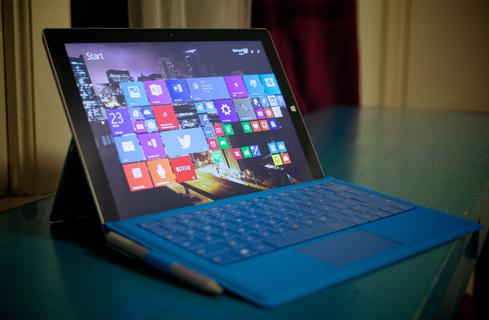Computex Rewind: 3 Takeaways For PC Users
It's a PC, it's a tablet, it's a… oh, I give up. Welcome to the weird new PC world, showcased at Computex show in Taiwan.


Surface Pro 3 Vs. World: Mobile Smackdown
Surface Pro 3 Vs. World: Mobile Smackdown (Click image for larger view and slideshow.)
News of the PC's demise has apparently failed to cross the Pacific Ocean. Global manufacturers unveiled a slew of new hardware at the annual Computex show in Taipei. If this is the post-PC era, or the post-post-PC era (GAHHHHH, make it stop!), PC makers seem to be making an awful lot of PCs. You could quibble about whether we should call these things PCs -- hold that thought for a moment -- but much of the Computex news points in the same direction: The PC is alive and well. It's just evolving.
Let's look at three key takeaways from Taiwan for PC users:
1. It's a PC, it's a tablet, it's a... oh, I give up
"Hybrid" is a good pick for the word of the week at Computex, as manufacturers showed off a bunch of new models that hope to capture the best of both the tablet and the laptop in a single device.
It's no sure thing that any of these will become hits with businesses or consumers, but there's at least one positive direction for the hybrid strategy. They're not just slapping a Bluetooth keyboard on an iPad and pretending it has the computing power of a fully loaded desktop. Likewise, they're not simply adding a touchscreen to a relatively bulky laptop (as some early Windows 8 models did) and saying, "Voila, the future is here!" There's clear imagination in how best to marry touch, productivity, and power, something that could play well with business users who don't treat the keyboard and touchpad (or mouse) as antiques.
[For more of the latest from Computex, see 8 Hot Windows Hybrids At Computex 2014.]
That imagination takes an Alice-down-the-rabbit-hole turn with Asus's Transformer Book V. It's a tablet, it's a laptop, it's a smartphone... it's SUPER-PC! The "five-mode device" is an Android smartphone, an Android tablet, an Android laptop, a Windows tablet, and a Windows laptop. (Got all that?)
2. "PC" is no longer code for "Wintel"
The term PC has been synonymous with Windows for many years (though it predates the OS), so much so that Apple built the multi-million-dollar "I'm a Mac" ad campaign around the de facto brand. But in the so-called post-PC era, that association is on the wane. Consider the Asus Transformer V as the lead exhibit, muddling traditional expectations of not only the form factor, but also the OS under the hood.
"For decades... 'PC' has implied a device based on Microsoft Windows and Intel microprocessors," said Techaisle analyst Anurag Agrawal in a new report on endpoint adoption among small and midsize businesses. "Through the course of this decade, that definition has been eroding."
{image 1}
While the shift has been percolating for a while, it may be at a turning point: Windows simply no longer has a stranglehold on the term PC. Witness HP's announcements in advance of and during the Computex show: The hardware giant's back-to-school PC lineup features five PCs, but only three of them run Windows. The HP Chromebook runs -- you guessed it -- Chrome. The HP SlateBook, meanwhile, runs Android on a 14-inch touchscreen notebook. It can't go unnoticed, particularly given the back-to-school market, that both PCs are a good bit less expensive than their Windows counterparts -- $279.99 for the Chromebook and $429.99 for the SlateBook. Each of the Windows models starts at $599.99.
3. This is a weird new world for Microsoft and its hardware partners
Since the Surface first saw light, media and analysts alike have wondered aloud how Microsoft would reconcile its own hardware production with its Windows hardware partners, and not without reason: Stalwarts like HP and Dell have been increasingly producing Chrome and Android devices, for instance. HP especially seems to be treating Microsoft more as direct competitor than partner these days -- CEO Meg Whitman said as much last year, and the company even began pumping Windows 7 PCs at a time when Windows 8.x needed all the help it could get.
Yet at Computex, which took place shortly after Microsoft introduced the Surface Pro 3, Microsoft OEM exec Nick Parker used a keynote address in part to tout new Windows hardware from HP, such as the HP Pro x2 612 hybrid, and models from other manufacturers. It's a strange, fragmented world order for both hardware and operating systems, one in which Microsoft must put its might behind the Surface Pro 3 while nearly simultaneously saying nice things about devices that could ultimately compete with the Surface for sales.
At the heart of everything, though, the PC -- personal computer, a tool for getting things done -- still lurks. If you want to call the Surface Pro 3 or any of the comparable hardware on display at Computex a tablet, a two-in-one, a hybrid, a doohickey, or what-have-you, have at it. They're all still ultimately about getting things done.
Trying to meet today's business technology needs with yesterday's IT organizational structure is like driving a Model T at the Indy 500. Time for a reset. Read our Transformative CIOs Organize For Success report today. (Free registration required.)
About the Author(s)
You May Also Like






